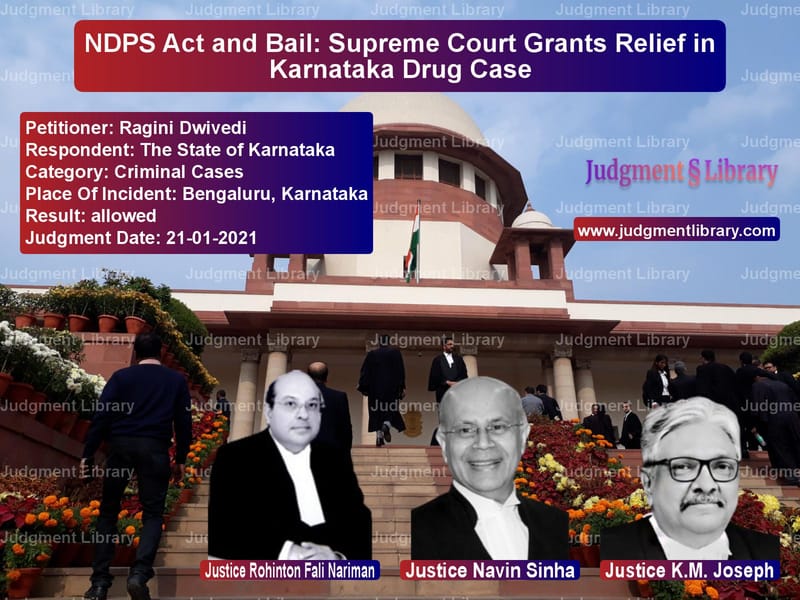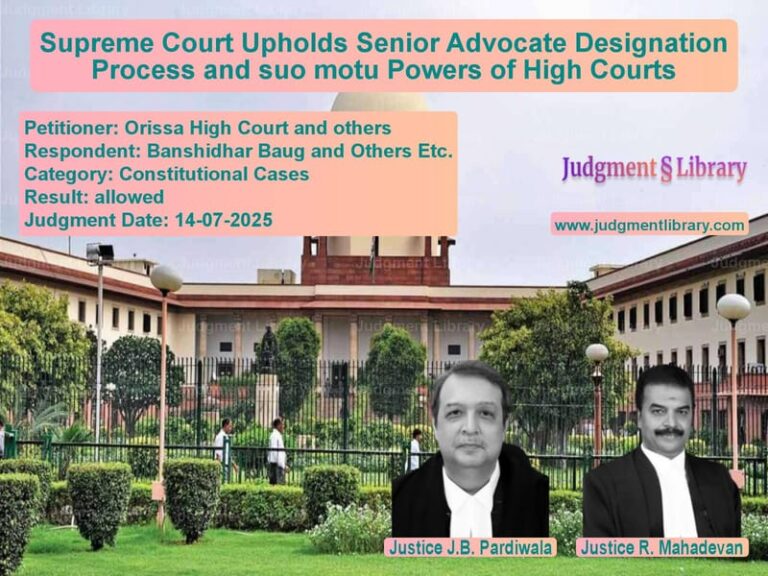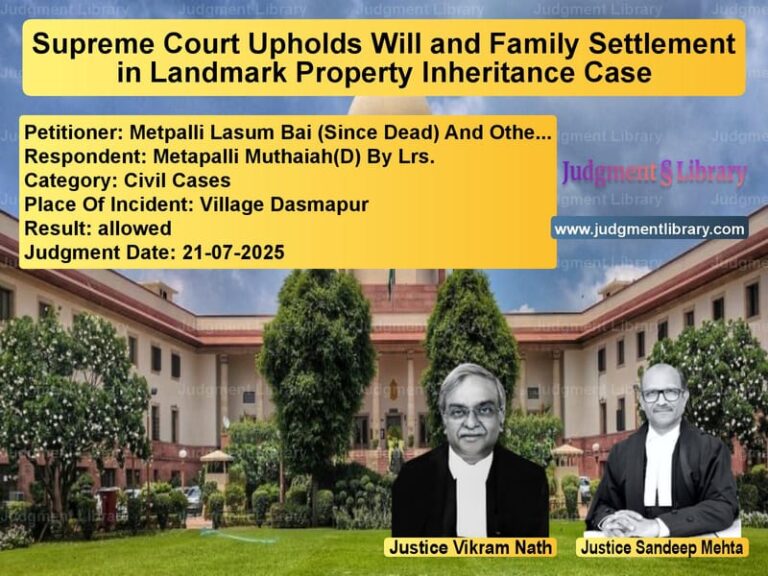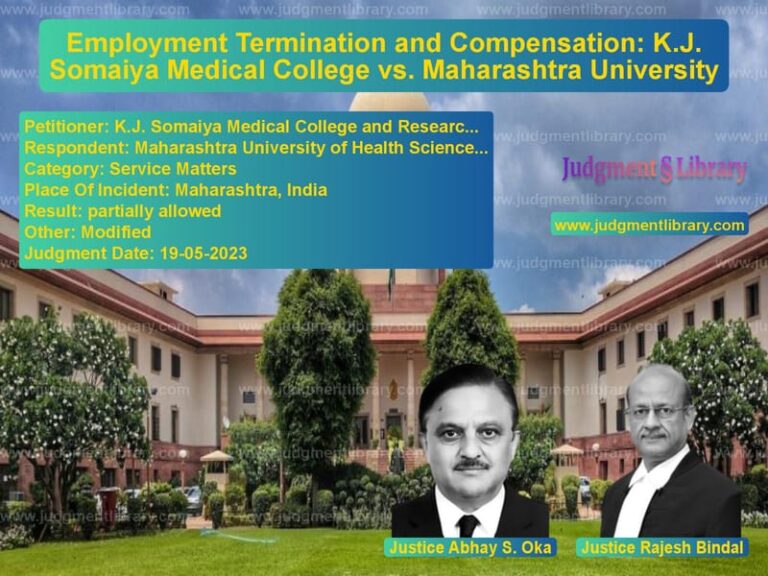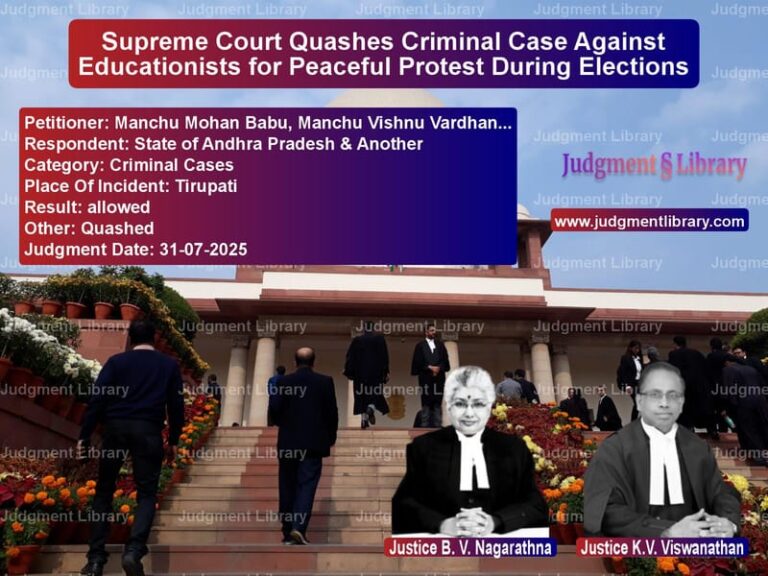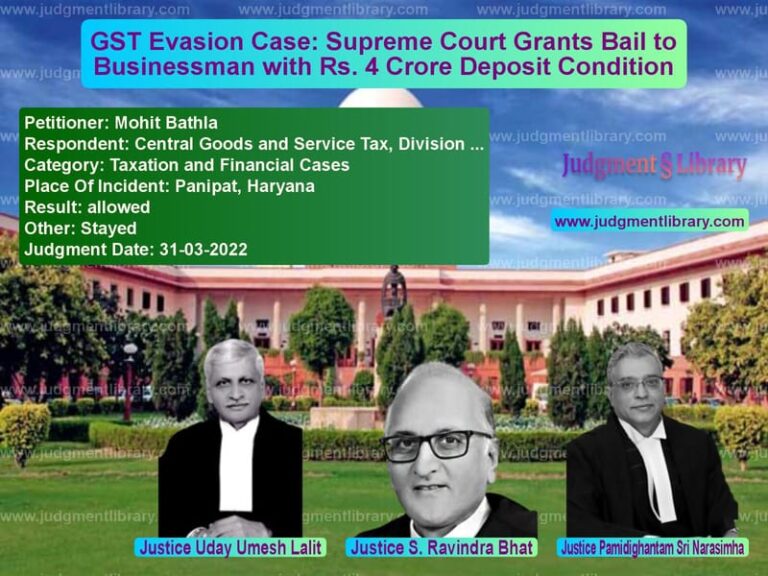NDPS Act and Bail: Supreme Court Grants Relief in Karnataka Drug Case
The Supreme Court of India in Ragini Dwivedi vs. The State of Karnataka ruled on an important case concerning bail under the Narcotic Drugs and Psychotropic Substances Act, 1985 (NDPS Act). The Court granted bail to actress Ragini Dwivedi and co-accused Shivaprakash, setting aside the Karnataka High Court’s order denying them bail.
Background of the Case
The case arose from a high-profile drug investigation conducted by the Central Crime Branch (CCB) in Bengaluru. On September 3, 2020, one B.K. Ravishankar was arrested, and his statement implicated Ragini Dwivedi and several others in an alleged drug trafficking and consumption racket.
Following the arrest of the appellant, Ragini Dwivedi, her residence was searched, but no drugs were found. However, based on statements made by co-accused and certain WhatsApp chats, she was charged under Sections 21, 21(c), 27A, 27(b), and 29 of the NDPS Act. The prosecution argued that she was part of a drug distribution network supplying drugs at high-profile parties.
The Karnataka High Court rejected her bail application on November 3, 2020, citing the stringent conditions under Section 37 of the NDPS Act. The appellant approached the Supreme Court seeking bail.
Key Legal Issues Addressed
1. Whether Section 37 of the NDPS Act Was Rightly Invoked
The trial court and the High Court denied bail based on Section 37 of the NDPS Act, which imposes strict conditions for granting bail in cases involving commercial quantities of drugs. The appellant argued that Section 37 was inapplicable since she was only accused of consumption and no drugs were recovered from her.
2. Whether a Prima Facie Case Was Made Out
The appellant contended that her arrest was solely based on the statement of a co-accused, which is inadmissible as evidence under Section 25 of the Indian Evidence Act, 1872. She also argued that the prosecution had failed to present independent material linking her to the alleged offense.
3. Whether Delay in Filing the Chargesheet Was Relevant
The appellant had been in custody since September 4, 2020, and no chargesheet had been filed within the stipulated time under Section 167(2) of the Code of Criminal Procedure, 1973. The defense argued that continued incarceration without substantial evidence was unjustified.
Findings of the Court
1. Section 37 Was Wrongly Applied
The Supreme Court ruled that Section 37 did not apply to the appellant’s case, as no commercial quantity of drugs was involved. The Court observed:
“The entirety of the case of the appellant is based upon the statement made by B.K. Ravishankar and the case diary. At the highest, it could possibly be said that the appellant consumed certain drugs at parties.”
The Court further held that invoking stringent bail conditions under Section 37 in such a case was legally unsustainable.
2. No Evidence of Drug Possession or Distribution
The Court emphasized that no drugs were found at the appellant’s residence, and no independent evidence linked her to the alleged drug network. It stated:
“Pursuant to the search made of the appellant’s premises, no drugs at all were found.”
The Court ruled that mere WhatsApp chats and statements of co-accused could not justify continued detention.
3. Delay in Filing Chargesheet Justified Bail
The Supreme Court noted that the appellant had been in custody for over four months without a chargesheet being filed. It ruled:
“This being the case, it is clear that Section 37 was wrongly invoked. With Section 37 out of the way, this is a case in which bail must ensue.”
Supreme Court’s Verdict
- The High Court’s order denying bail was set aside.
- The appellant was granted bail, subject to conditions imposed by the trial court.
- The ruling also applied to co-accused Shivaprakash, who was granted anticipatory bail.
- The Court clarified that its observations would not affect the trial or further investigation.
Conclusion
This ruling reinforces fundamental principles of criminal law and bail jurisprudence:
- Section 37 of the NDPS Act applies only to cases involving commercial quantities of drugs.
- Mere statements of co-accused and WhatsApp chats cannot be the sole basis for denial of bail.
- Prolonged incarceration without evidence violates individual liberty.
- Bail must be granted where charges are weak and a trial is unlikely to conclude soon.
The Supreme Court’s decision ensures that individuals accused of drug consumption are not subjected to disproportionate legal consequences in the absence of substantive evidence.
Petitioner Name: Ragini Dwivedi.Respondent Name: The State of Karnataka.Judgment By: Justice Rohinton Fali Nariman, Justice Navin Sinha, Justice K.M. Joseph.Place Of Incident: Bengaluru, Karnataka.Judgment Date: 21-01-2021.
Don’t miss out on the full details! Download the complete judgment in PDF format below and gain valuable insights instantly!
Download Judgment: ragini-dwivedi-vs-the-state-of-karnata-supreme-court-of-india-judgment-dated-21-01-2021.pdf
Directly Download Judgment: Directly download this Judgment
See all petitions in Bail and Anticipatory Bail
See all petitions in Drug Possession Cases
See all petitions in Judgment by Rohinton Fali Nariman
See all petitions in Judgment by Navin Sinha
See all petitions in Judgment by K.M. Joseph
See all petitions in allowed
See all petitions in supreme court of India judgments January 2021
See all petitions in 2021 judgments
See all posts in Criminal Cases Category
See all allowed petitions in Criminal Cases Category
See all Dismissed petitions in Criminal Cases Category
See all partially allowed petitions in Criminal Cases Category

